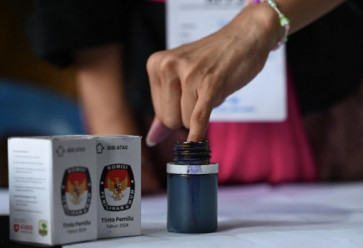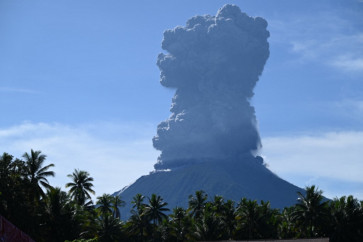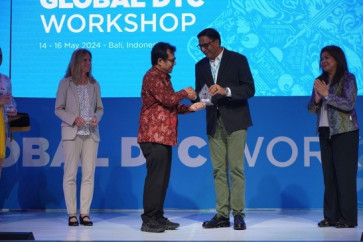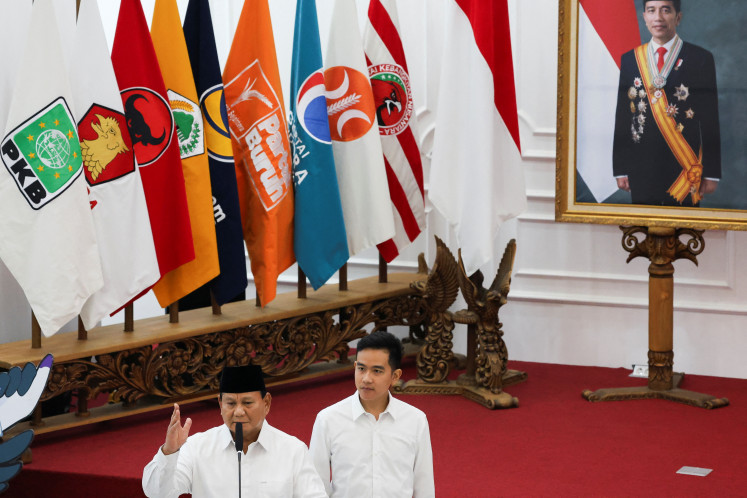Ma’ruf's 100 days of deliberate solitude
As President Joko “Jokowi” Widido’s vice president, Ma’ruf Amin has spent his first 100 days in office out of the spotlight, drawing unfavorable comparisons to his predecessor and raising questions about his role as the country’s second-in-command
Change Size

A
span>As President Joko “Jokowi” Widido’s vice president, Ma’ruf Amin has spent his first 100 days in office out of the spotlight, drawing unfavorable comparisons to his predecessor and raising questions about his role as the country’s second-in-command.
The senior Muslim cleric’s advanced age and relatively limited experience in party politics was predicted to cause him to have a more peripheral role than former vice president Jusuf Kalla, and the past few months seem to have confirmed that, observers have noted.
“Pak Ma’ruf was chosen as [Jokowi’s] running mate for symbolic reasons, and he seems to be playing a symbolic role as vice president,” Firman Noor, head of the Indonesian Institute of Sciences (LIPI) Political Research Center, told The Jakarta Post on Wednesday.
He added that Ma’ruf’s political capacity was very different from Kalla’s, resulting in Ma’ruf playing a much smaller part in Jokowi’s administration.
Kalla, former chairman of the Golkar Party, brought a wealth of political and business experience to the office, having been a successful businessman before jumping into politics. He had previously served as a coordinating minister in former president Megawati Soekarnoputri’s Cabinet and as vice president to former president Susilo Bambang Yudhoyono.
An outspoken man, Kalla often weighed in on current issues during his time as Jokowi’s deputy, even those that did not directly concern the vice presidential office. He also played a large role in policymaking, particularly in relation to the economy.
In contrast, Ma’ruf had been out of party politics for over a decade when he was tapped as Jokowi’s running mate in 2018. Since then, he has been mostly involved in religious organizations, having formerly headed Islamic mass organization Nahdlatul Ulama as its rais aam (supreme leader) and currently holding a position as nonactive chairman at the Indonesian Ulema Council (MUI).
Over the past few months, Ma’ruf has spent most of his time receiving visits from ambassadors and religious leaders, including Russell M. Nelson, the president of the Church of Latter-day Saints.
Ma’ruf’s visit to Japan a day after the inauguration to attend Emperor Naruhito’s coronation appeared to hint at a larger foreign affairs role — similar to Kalla’s. But in December, the 76-year-old, who is the country’s oldest-ever vice president to be sworn in, canceled his attendance at the Kuala Lumpur Summit in Malaysia due to exhaustion and has not gone on an overseas trip since.
His supporting role in the office has mirrored the one he had on the campaign trail, harkening back to his less-than-inspired performance at the first presidential debate last year when he said “I have nothing to add” in response to an invitation to speak.
Ma’ruf has claimed that his lack of prominence has been deliberate.
“I am the vice president. The President should be the one who stands out. If the vice president stands out, there will be twin suns,” Ma’ruf told reporters at the Vice Presidential Palace in Central Jakarta on Wednesday.
He said that, despite being out of the spotlight, he carried out his duties as vice president well, for example by representing the President in events and by voicing his opinions during Cabinet meetings.
“I also handle various issues that have been assigned [to me] by the President, but in a coordinating role,” he said, adding that the ministers were the ones who had the operational role.
He also claimed that in his 100 days in the office he had chaired coordination meetings on topics such as small and medium enterprises, radicalism and poverty. “I coordinate. That’s what my duties are as vice president,” he said.
While polls showed that Ma’ruf did not significantly increase Jokowi’s electability directly, experts and observers said the cleric acted as a bulwark against religious attacks on Jokowi — a key role given that the opposing Prabowo Subianto-Sandiaga Uno ticket had strong support from the conservative Muslim base.









